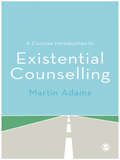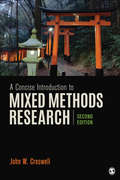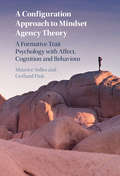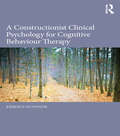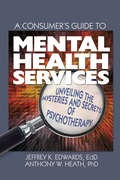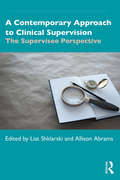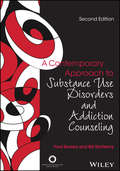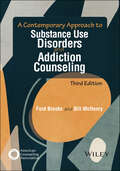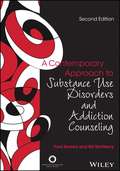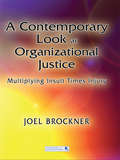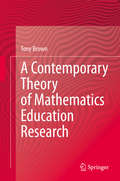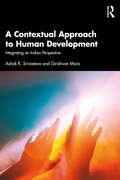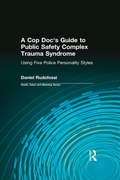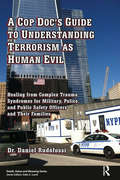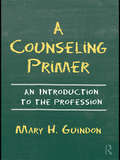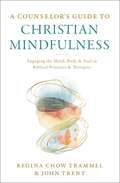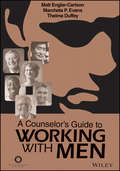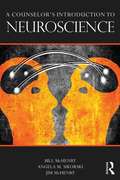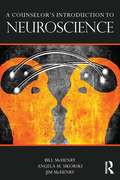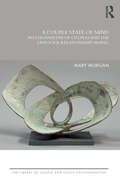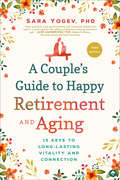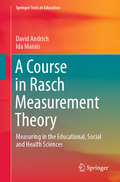- Table View
- List View
A Concise Introduction to Existential Counselling
by Martin Adams'A concise introduction to existential counselling is a superb addition to the literature on existential counselling and psychotherapy. Martin Adams provides an excellent overview of the field for those who are new to it at the same time as distilling key features in a way which will be valuable for experienced practitioners' - Meg Barker, Senior Lecturer in Psychology at the Open University A Concise Introduction to Existential Counselling is just that: a brief and accessible pocket guide to the underlying theory & practice of the existential approach. Addressing everything a new trainee needs to know and do in a way that is entirely accessible and jargon-free, this book: - Provides a short history of the existential tradition - Puts key concepts into contexts, showing how theory translates into practice - Discusses issues in the therapeutic process - Shows how to work effectively with whatever the client brings to the session - Addresses the significance of existential thought in the wider world This book will be the perfect companion to new trainees looking to embark on their path to thinking and practicing existentially. Martin Adams is a practitioner and supervisor in private practice and a Lecturer at the New School of Psychotherapy and Regents College, both in London.
A Concise Introduction to Mixed Methods Research
by John W. CreswellFor students and researchers new to mixed methods, A Concise Introduction to Mixed Methods Research 2e by renowned author John W. Creswell provides a brief and practical introduction to mixed methods. Many graduate students and researchers in the social, behavioral and health sciences may not have the time or resources to read long treatises or stacks of journal articles on mixed methods research. This text quickly describes the basics of setting up and conducting a study using this methodology. Chapters are short and follow the process of research, from ensuring skills for conducting research, acknowledging the steps in planning a study, designing studies with increasing complexity, planning sampling strategies and integration, and writing up the results of your study. Get started in mixed methods quickly with this brief primer.
A Concise Introduction to Mixed Methods Research
by John W. CreswellFor students and researchers new to mixed methods, A Concise Introduction to Mixed Methods Research 2e by renowned author John W. Creswell provides a brief and practical introduction to mixed methods. Many graduate students and researchers in the social, behavioral and health sciences may not have the time or resources to read long treatises or stacks of journal articles on mixed methods research. This text quickly describes the basics of setting up and conducting a study using this methodology. Chapters are short and follow the process of research, from ensuring skills for conducting research, acknowledging the steps in planning a study, designing studies with increasing complexity, planning sampling strategies and integration, and writing up the results of your study. Get started in mixed methods quickly with this brief primer.
A Configuration Approach to Mindset Agency Theory: A Formative Trait Psychology with Affect, Cognition and Behaviour
by Maurice Yolles Gerhard FinkThis book explains psychological, sociopolitical and organisational change in multidisciplinary settings. It shows how advanced techniques of contextual analysis can be applied to complex situations and offers a new cybernetic agency paradigm based on living systems theory. It models, diagnoses, and analyses complex, realworld situations to anticipate patterns of behaviour.
A Constructionist Clinical Psychology for Cognitive Behaviour Therapy
by Kieron P. O'ConnorMost clinical psychologists and cognitive behaviour therapists adopt a perspective which assumes that a client's distress arises from inaccurate perceptions of the external world and that these perceptions are due to the problematic filtering of information about the external world through internal perceptual biases and schemas. A Constructionist Clinical Psychology for Cognitive Behavioural Therapy provides a timely and innovative critique of the dominant trends in CBT theory and practice. It applies a constructionist framework to treatment and offers a constructionist philosophy and methodology to complement existing clinical approaches in cognitive behaviour therapy. <P><P> Kieron O'Connor presents a much needed alternative constructionist framework (addressing both individual and social constructionist ideas) which is laid out in a clear fashion for the clinician. He shows how the framework can be integrated into practice and offers an alternative to viewing psychopathology as an isolated problem which focuses on pathology as a response to internal or external events. He reveals how the new constructionist framework can encourage clinicians to look at the client centred context which creates psychopathology and explore areas and experiences not easily accessible to traditional cognitive behaviour approaches, but which are rendered understandable through a constructionist approach to experience. <P><P> Using extensive case studies, A Constructionist Clinical Psychology for Cognitive Behavioural Therapy provides a constructionist framework approach which complements existing CBT approaches and shines new light on questions as to why some techniques work and others do not. With new tools for case formulation and evaluation, and trainee exercises for beginners, the book will appeal to clinical psychologists, clinical researchers, psychotherapists and other health and mental health professionals
A Consumer's Guide to Mental Health Services: Unveiling the Mysteries and Secrets of Psychotherapy
by Jeffrey K. Edwards Anthony W. HeathA unique consumer resource for understanding mental health treatment With over 250 models of counseling and psychotherapy currently used to treat emotional problems and serious mental illness, figuring out where to look for the right services can be a daunting task. A Consumer&’s Guide to Mental Health Services offers pragmatic solutions for those considering or already beginning treatment. It helps you to make important decisions regarding whether seeing a psychiatrist, a social worker, a counselor, or a psychologist is best for your particular needs. It also explores health insurance and coverage of treatment as well as how long it may take for you to begin feeling like yourself again. This valuable text looks at the intricacies of the mental health care system and provides a helpful summary that is both accessible and useful. If you&’ve ever tried to find help for a major life transition, depression, or anxiety and have been overwhelmed by the options for mental health treatment, you are not alone. A Consumer&’s Guide to Mental Health Services is a unique text that breaks down the vast array of service options with a critical eye so consumers can get the vital information they need in a straightforward and accessible way. This comprehensive text even includes a "Questions to Ask" section that will help you find the right clinician to fit your exact needs. Some of the topics A Consumer&’s Guide to Mental Health Services covers in detail are: causes of mental health problems the three main models of mental health how clinicians who use the different models view mental health types of providers available and the different services they offer talk therapies and medications ethical codes of all professions consumers&’ rights the insurance industry, its history and current role matching treatment to the problem alternatives to therapy and much more! A Consumer&’s Guide to Mental Health Services is a valuable and practical resource for anyone considering or beginning mental health treatment or their family and friends. It is also a useful addition for educators or students working through introductory courses in all of the major mental health fields.
A Contemporary Approach to Clinical Supervision: The Supervisee Perspective
by Liat ShklarskiThe most critical and influential relationship affecting one’s growth as a mental health professional is the relationship between the clinician and the supervisor. Good supervisors breed good therapists. This book goes beyond facts and figures to provide an innovative perspective on the supervision process. Through contributions by seven supervisees and the supervisor they all shared, readers are offered a rare glimpse into what takes place during the supervision hour. This book not only offers insight into the elements integral to effective supervision, but also teaches about the supervisory relationship. With contributors from various disciplines, theoretical orientations, and cultures, it shows how the supervisee and supervisor are able to navigate these differences while still gaining the most from supervision. Topics that are covered include cultural competence in multicultural supervision and remote supervision when it is conducted between clinicians in different countries, as well as an original study by the authors on the experiences of supervisees during the global Covid-19 pandemic and the transition to remote supervision. For mental health professionals who are training to be supervisors or experienced supervisors looking to improve their skills, this book will serve as an invaluable resource for professional development.
A Contemporary Approach to Substance Abuse and Addiction Counseling: A Counselor's Guide to Application and Understanding
by Bill Mchenry Ford BrooksA Contemporary Approach to Substance Abuse and Addiction Counseling provides a basic understanding of the nature of substance abuse and addiction, its progression, and clinical interventions for college/university, school, and community/mental health agency settings.
A Contemporary Approach to Substance Use Disorders and Addiction Counseling
by Ford Brooks Bill McHenryWritten as an introduction to the field of addiction counseling, this text covers the fundamental knowledge and skills necessary to counsel people who are struggling with addiction. Drs. Brooks and McHenry provide a straightforward and holistic approach to treatment and recovery, from the major theoretical underpinnings, to assessment and diagnosis, to relapse prevention and spirituality. With a focus on current clinical applications and how-tos, this book is ideal both for master’s-level addictions courses and mental health clinicians. Topics covered are cultural and gender issues, including work with LGBT clients; drug classifications and referral; assessment, diagnosis, and interview techniques; the continuum from nonuse to addiction; work in college/university, school, and community/mental health agency settings; developmental approaches in treatment; the role of the family; grief and loss in addiction; group counseling; relapse and recovery; spirituality and support groups; addictions training, certification, and ethics; and the importance of counselor self-care. Exploration questions and suggested activities are presented in each chapter. *Requests for digital versions from the ACA can be found on wiley.com. *To request print copies, please visit the ACA website here. *Reproduction requests for material from books published by ACA should be directed to permissions@counseling.org.
A Contemporary Approach to Substance Use Disorders and Addiction Counseling
by Ford Brooks Bill McHenryA unique offering of both knowledge and information, this third edition reflects the latest practices and time-tested data. Brooks and McHenry offer relevant case examples that showcase the therapy process as it relates to clients with a substance use disorder and the impact on their families. New approaches and techniques of medication-assisted treatment with opiate addiction, harm reduction, the use of peer recovery specialists and drug courts, and the importance of addressing trauma in the treatment process are thoroughly presented to ensure effective work with clients from intake through recovery. With a look at the impact of the COVID-19 pandemic included, mental health professionals will gain an empathic understanding of the nonlinear process of recovery. A supplemental Instructor’s Guide is available by request from ACA. *Requests for digital versions from ACA can be found on www.wiley.com *To purchase print copies, please visit the ACA website here *Reproduction requests for material from books published by ACA should be directed to permissions@counseling.org
A Contemporary Approach to Substance Use Disorders and Addiction Counseling, Second Edition
by Bill Mchenry Ford BrooksWritten as an introduction to the field of addiction counseling, this text covers the fundamental knowledge, understanding, and skills necessary to counsel people who are struggling with addiction. Drs. Brooks and McHenry provide a straightforward, compassionate, and holistic approach to treatment and recovery, from the major theoretical underpinnings, to assessment and diagnosis, to relapse prevention and spirituality. With a focus on current clinical applications and how-tos, this book is ideal both for master s-level addictions courses and for mental health clinicians.
A Contemporary Look at Organizational Justice: Multiplying Insult Times Injury (Organization and Management Series)
by Joel BrocknerThis book is for scholars with an interest in the burgeoning area of theory and research on organizational justice. The ideas it describes forge connections between the justice literature and other prominent bodies of knowledge in organizational and social psychology, including those pertaining to trust, social identity, attribution theory, regulatory focus theory and cross-cultural differences in people's beliefs and behaviors. Though intended primarily for researchers, this book is written in a very accessible way, so that informed practitioners will gain considerable value from it.
A Contemporary Theory of Mathematics Education Research
by Tony BrownThis book by-passes both psychology and sociology to present an original social theory centered on seeing mathematical learning by everyone as an intrinsic dimension of how mathematics develops as a field in support of human activity. Here, mathematics is defined by how we collectively talk about it. Drawing on psychoanalytic theory, the student is seen as participating in the renewal of mathematics through their contributions to our collective gaze on mathematics as the field responds to ever new demands. As such learning takes a critical stance on the standard initiations into current practices often promoted by formal education.In the field of mathematics education, researchers have moved from psychology where individual students were seen as following natural paths of development through existing mathematical knowledge, to socio-cultural models predicated on students being initiated into the human world and understood through the reflective gazes this world has of itself, such as those found in comparisons of student learning in different countries. This book addresses the domain, purpose and functioning of contemporary research in mathematics education and is an original contribution to this theme.The book is aimed at a mathematics education research audience. It continues a dialogue with existing publications, seen widely as a cutting edge and will also be of interest to students and practitioners in the fields of qualitative research, social theory and psychology.
A Contextual Approach to Human Development: Integrating an Indian Perspective
by Girishwar Misra Ashok K. SrivastavaThis textbook offers a unique insight into the theoretical and applied aspects of human development in relation to the cultural traditions of non-Western countries.Presented in a modular form, this comprehensive and thematic approach to lifespan development will help students develop an understanding of human development in varied Indian social contexts. Covering all stages of development including the development of self and personality, social understanding, human strengths, sustainable development, lifelong learning, and many more, the book highlights current research in these areas as well as provides learning objectives, points for reflection, web links, and a glossary.This book is an essential reading for undergraduate students of psychology, human development, and allied fields, as well as for postgraduates with an interest in studying human development in a non-Western context.
A Cop Doc's Guide to Public Safety Complex Trauma Syndrome: Using Five Police Personality Styles (Death, Value and Meaning Series)
by Daniel Rudofossi Dale A Lund"Cop Doc's Guide to Public Safety Complex Trauma Syndrome" is written in response to the need for an advanced, specialized guide for clinicians to operationally define, understand, and responsibly treat complex post-traumatic stress and grief syndromes in the context of the unique varieties of police personality styles. The book continues where Rudofossi's first book, "Working with Traumatized Police Officer Patients", left off. Theory is wed to practice and practice to effective interventions with police officer-patients. The 'how' and 'why' of a clinician's approach is made highly effective by understanding the distinct personality styles of officer-patients. Rudofossi's theoretical approach segues into difficult examples that highlight each officer-patient's eco-ethological field experience of loss in trauma, with a focus on enhancing resilience and motivation to - otherwise left disenfranchised. Thus, this original work expands the ecological-ethological existential analysis of complex PTSD into the context of personality styles, with an emphasis on resilience - without ignoring the pathological aspects of loss that often envelop officer-patient trauma syndromes.
A Cop Doc's Guide to Understanding Terrorism as Human Evil: Healing from Complex Trauma Syndromes for Military, Police, and Public Safety Officers and Their Families (Death, Value, and Meaning)
by Daniel RudofossiFirst Published in 2017. This book provides profound insights into the terrorist mind, the impact of terrorism on the hearts and minds of those who must confront and battle the evil of terrorism, case studies in courage in the battle against terrorism, and (finally, most of all) this book provides a strategy and underlying set of principles that we must use to defeat terrorism and “not only survive but . . . give strength back to others.”
A Counseling Primer: An Introduction to the Profession
by Mary H. GuindonA Counseling Primer presents an introduction to the counseling profession that provides students with a foundation for success. This engaging and accessible text covers the core CACREP Standard of Professional Orientation with a comprehensive overview of the field. It: Anticipates the questions of beginning students with a series of chapters that ask who counselors (and clients) are, what counseling is, when and where it is practiced, and why counselors choose the profession. Introduces students to the basics of essential attending and listening skills. Challenges readers with case vignettes and discussion questions. Encourages self-reflection and offers skills for observation of others. Supports student learning with extensive pedagogical features and resources. Enhances the reading experience with a robust online instructor's manual. This engaging textbook is full of useful features to enhance the learning experience. Each chapter includes "points to ponder", case examples, an "in practice: what would you do?" vignette with discussion questions, and a chapter summary. A self-reflection journaling exercise, termed the TFAC Chart (Thoughts, Feelings, Actions, Context) reinforces the material from each chapter and facilitates student growth. A Counseling Primer: An Introduction to the Profession is accompanied by a rich array of supplementary materials that are made available to qualifying adopters and their students completely free of charge. Our online resources are hosted on the Moodle course management system. Instructor Resources include: A sample course syllabus Chapter-by-chapter PowerPoint lecture slides Chapter-by-chapter Instructor Notes, including chapter summary, learning objectives, and instructions for suggested in-class activities and assignments An interactive test bank for each chapter (including multiple choice, true or false, and essay question formats). The tests and notes are available for download by instructors in a variety of useful formats, to suit your needs. Student Materials include: TFAC (Thoughts, Feelings, Actions, and Context) Journaling forms for self-reflection Class handouts for assigned and optional review activities
A Counseling Primer: An Orientation to the Profession
by Mary H. Guindon Jessica J. LaneA Counseling Primer, second edition, introduces students to the profession of counseling, reviews its training curriculum, discusses current professional standards, and presents basic counseling skills. The text is designed to answer students’ most commonly asked questions around the who, what, where, when, why, and how of counseling. Updated and aligned with the eight 2016 CACREP core areas, the second edition includes new chapters by experts from seven entry-level specialty areas, including school counseling, career counseling, and mental health counseling. The book also contains useful features to enhance the learning experience, including case examples, class handouts and activities, a sample syllabus, discussion questions, and more. A variety of online resources including instructor’s manual, PowerPoint slides, tests, class activities, and student supplements are also available for download. In a comprehensive and accessible format, A Counseling Primer, second edition, provides students with a succinct, up-to-date picture of the counseling profession and the tools they need to make their contribution to the field.
A Counselor's Guide to Christian Mindfulness: Engaging the Mind, Body, and Soul in Biblical Practices and Therapies
by John Trent Dr. Regina Chow TrammelEquips Christian counselors and therapists to confidently use mindfulness techniques with their clients in a way that is both practical and biblical. Accessing mindfulness is a therapeutic touchstone for a range of emotional issues, from mild distress to the treatment of trauma, but the term mindfulness has often left Christians wary. Stripped of Christlike spirituality, it sounds self-focused at best, and at worst like a fusion with modern pop-religions of the day.But the quality of mindfulness—of being fully present, aware of ourselves and our situation so that we can better respond to the chaos around us—is a profoundly biblical concept. And it can be used effectively by Christian counselors and healing practitioners.In A Counselor's Guide to Christian Mindfulness, Regina Chow Trammel (a clinical social worker) and John Trent (a marriage and family therapist) team up to offer training in mindfulness skills used in evidence-based practices, such as dialectical behavioral therapy, acceptance and commitment therapy and mindfulness-based cognitive therapy. These therapies have been shown to be highly effective in the treatment of many mental health issues, blending elements of neuroscience, social science, and religious training.This book is the ideal resource to equip those in the helping professions to faithfully use mindfulness interventions both professionally and personally and includes:A historical and theoretical overview of Christian mindfulness and how it contrasts with other mindfulness-based practices.A practical guide for how to use mindfulness skills in counseling and therapeutic practice.A section addressing specific challenges or situations that your clients face.Dialogue scripts and contemplation exercises to adapt for your own work.The practice of Christian mindfulness can be effective in helping clients manage their intrusive and stressful thoughts, emotions, relationships, and challenges. This book fills a gap for Christian counselors and therapists who are eager for a resource that teaches mindfulness skills from a Christian and biblical perspective.
A Counselor's Guide to Working with Men
by Matt Englar-Carlson Marcheta P. Evans Thelma DuffyThis book examines a variety of critical issues pertaining to the psychology of men and masculinity and presents successful, evidence-based strategies for treatment. Part 1 focuses on treating men in couples counseling, group work, and career counseling, as well as counseling men about their health. Part 2 explores the intersections of identity for sexual minority men, older men, and fathers, and discusses spiritual work with men in life transitions. Part 3 addresses the concerns of men in the military, prevention of sexual violence, and treating men with addictions and trauma-related issues. Part 4 provides the specific clinical frames of female counselors using relational–cultural theory with men, and examines using motivational and masculine-sensitive therapy with men. Examples and vignettes throughout the text provide clinical relevance, and reflective questions in each chapter encourage readers to explore their own biases and ideas about working with men. *Requests for digital versions from the ACA can be found on wiley.com. *To request print copies, please visit the ACA website here. *Reproduction requests for material from books published by ACA should be directed to permissions@counseling.org.
A Counselor's Introduction to Neuroscience
by Bill Mchenry Angela M. Sikorski Jim MchenryThe book is about the complexities of human brain and counselling. The authors have clearly explained the overlap of these two fields, that is easily comprehensible by a lay man.
A Counselor’s Introduction to Neuroscience
by Angela M. Sikorski Bill McHenry Jim McHenryA Counselor’s Introduction to Neuroscience is a guidebook to neurobiology that is customized for counselors’ unique goals and requirements. Drawing on years of experience, not only in the lab, but in the counselor’s chair, the authors unravel the complexities of neuroscience and present an easily understood volume that is an essential companion for any counselor who wishes to expand his or her understanding of the human brain, how it works, and how it creates our identities.
A Couple State of Mind: Psychoanalysis of Couples and the Tavistock Relationships Model (The Library of Couple and Family Psychoanalysis)
by Mary MorganA Couple State of Mind is a much anticipated book aimed at an international audience of practitioners, students and teachers of psychoanalytic couple therapy, describes the Tavistock Relationships model of couple psychoanalytic psychotherapy, drawing on both historical and contemporary ideas, including the author’s own theoretical contributions. The book references contemporary influences of other psychoanalytic approaches to couples, particularly from an international perspective. It will be invaluable for all students learning about psychoanalytic work with couples for other psychoanalytic practitioners interested in this field.
A Couple's Guide to Happy Retirement and Aging: 15 Keys to Long-Lasting Vitality and Connection
by Sara YogevA Couple’s Guide to Happy Retirement and Aging is the most comprehensive book devoted entirely to individual and couples relationship issues in the later stage of life. Not a treatise on money management, this is a much-needed guide to the psychological aspects of aging and how to make your relationship happy, fruitful, loving, and successful during your retirement years.Written by Dr. Sara Yogev, a psychologist specializing in work and family issues, A Couple's Guide to Happy Retirement and Aging summarizes the latest research findings and draws from actual accounts of couples. This book will help you and your partner:prepare emotionally for the dramatic life changes during retirement yearsfind new purposes to your life beyond worknurture your relationship and strengthen your friendship and love as you ageexplore sexuality at this stage of life including how you can enjoy each other as much as you did as a younger coupleimplement strategies to successfully deal with differences around money, time together versus apart, housework, and family relationshipsThe 2018 edition includes new chapters about substance abuse, cohabitation, and the impact of technology on senior couples as well as updates to all previous chapters. It is crucial that couples prepare themselves and their marriages psychologically for their retirement years, which could very well be a quarter of their lives. A Couple’s Guide to Happy Retirement and Aging shows you how to do that—so that you’ll have the time of your lives.
A Course in Rasch Measurement Theory: Measuring in the Educational, Social and Health Sciences (Springer Texts in Education)
by David Andrich Ida MaraisThis book applies Rasch measurement theory to the fields of education, psychology, sociology, marketing and health outcomes in order to measure various social constructs. The chief focus is on first principles of both the theory and its applications. Because software is readily available to carry out analyses of real data, numerous small examples are provided in the book. The software used in these examples, and which is helpful in working through the text, is RUMM2030 (Rasch unidimensional models for measurement).The book’s main goals are to equip researchers with the confidence they need in order to be in control of the analysis and interpretation of data, and to make professional rather than primarily statistical decisions mechanically. Because statistical principles are necessarily involved, reviews of the requisite statistics are provided in the Appendix.The content is based on courses that have been taught both online and in intensive form for over two decades. Although first principles are emphasised, much of the book is based on research conducted by the two authors and their colleagues.
